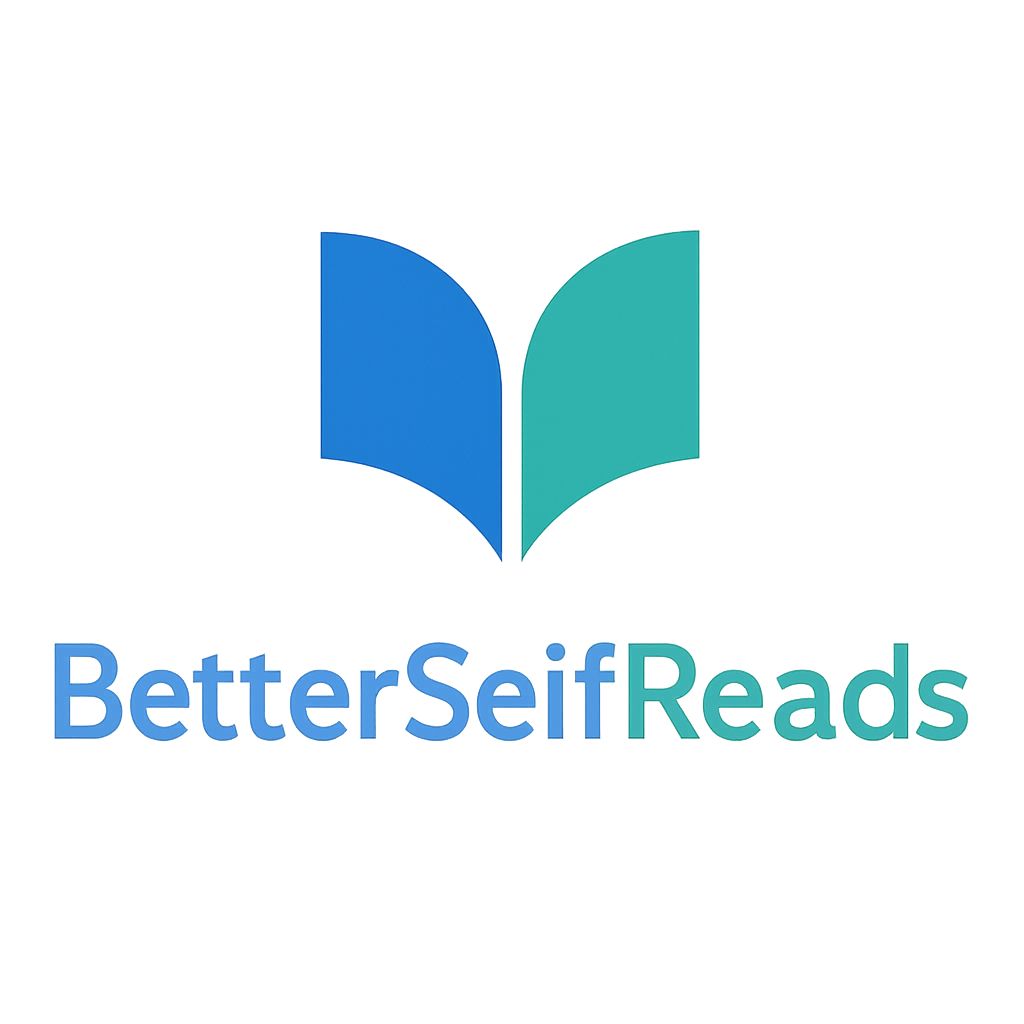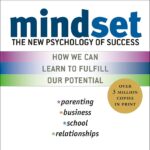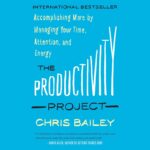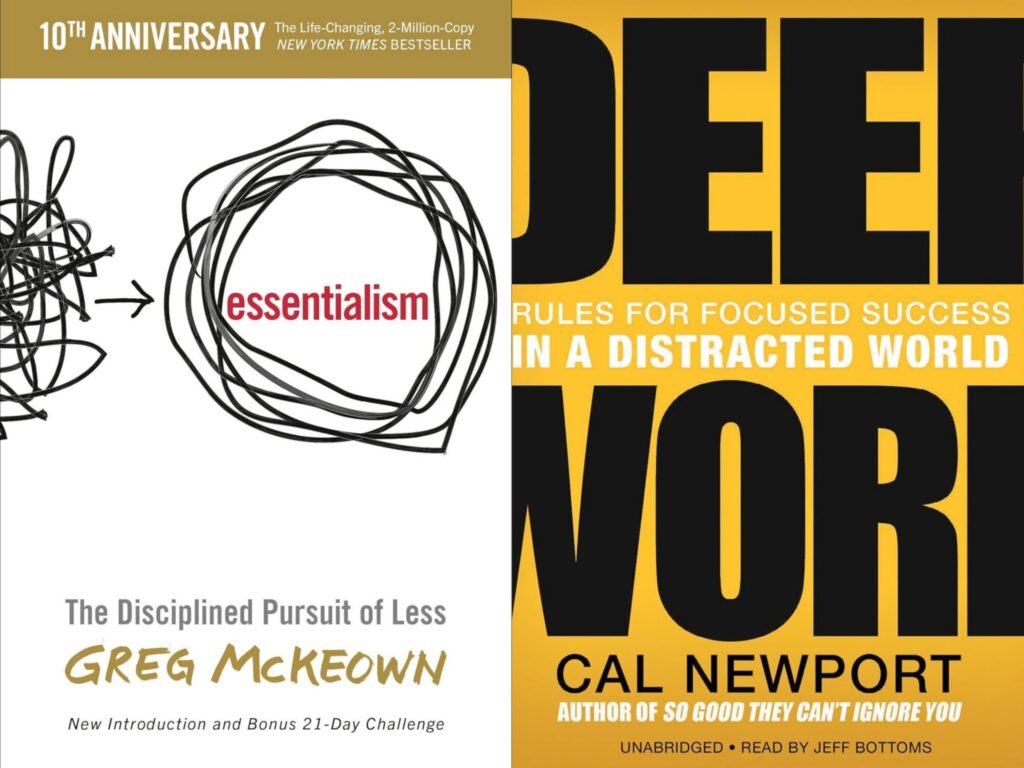
Life today often feels like juggling too many balls at once. Students and professionals alike are overwhelmed by constant notifications, endless deadlines, and the pressure to always be on. Maybe you’ve felt it too the anxiety of being busy without really moving forward.
In moments like these, two ideas stand out as possible solutions: Deep Work vs Essentialism. These aren’t just productivity buzzwords. They are philosophies of life that can help you reclaim your focus, cut through the noise, and build a more meaningful path.
The answer that so many people are searching for isn’t “doing more.” It’s doing better. By comparing Deep Work vs Essentialism, we begin to see that real success comes from combining focus with intention. This article will help you understand both, explore their lessons in depth, and most importantly, show you how they can make your daily life feel lighter and more purposeful.
Why This Matters for Students and Professionals
If you’ve ever pulled an all-nighter only to realize half your time was lost scrolling on your phone, you already know the problem: distraction steals not just time but energy. Similarly, if your calendar is full of commitments that don’t truly matter to you, it’s no surprise you feel drained.
This is why Deep Work vs Essentialism isn’t just an abstract debate it’s a real solution. Deep Work teaches you how to focus, while Essentialism reminds you what deserves your focus. Together, they offer relief from the chaos of modern life.
Deep Work: The Power of Focus
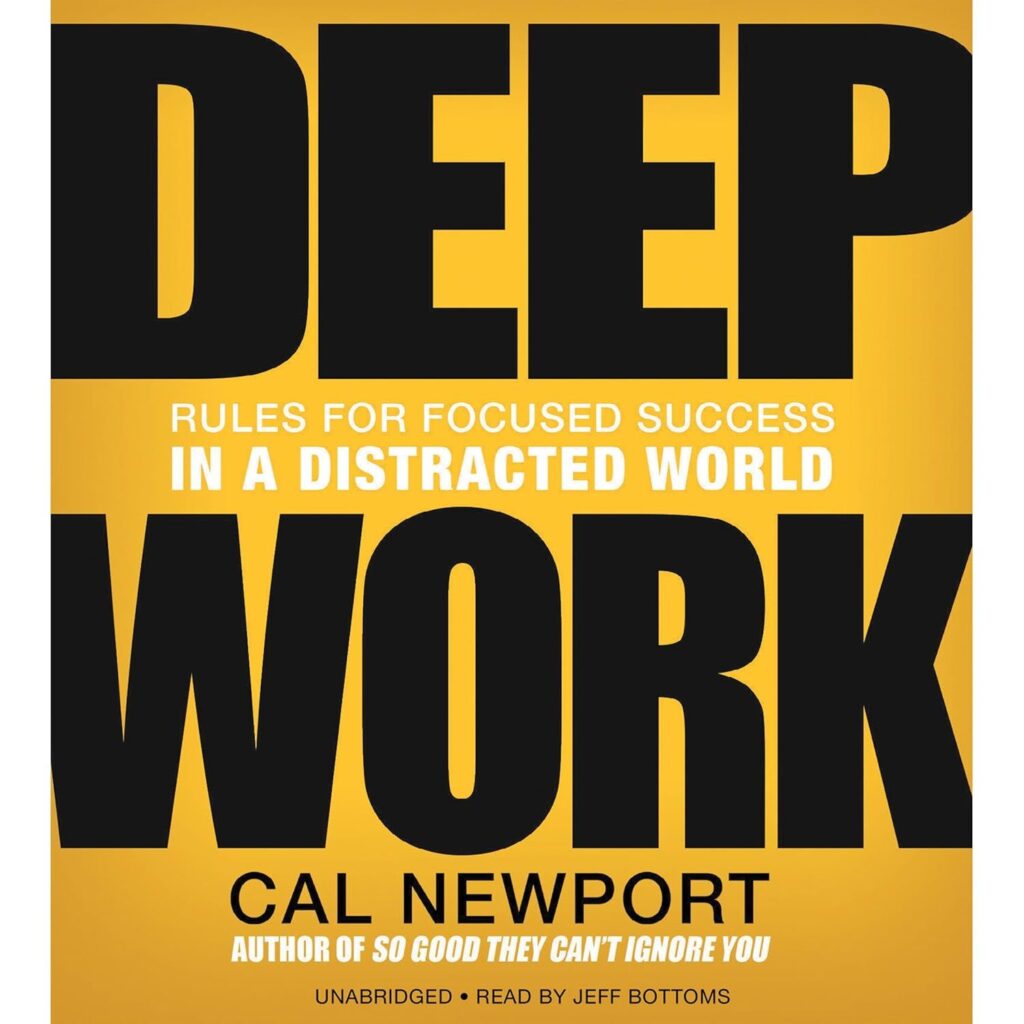
Cal Newport’s Deep Work makes a bold claim: the ability to focus without distraction is like a superpower in today’s world. And he’s right. In an age where most people’s attention is scattered across ten apps, being able to sit down and concentrate deeply sets you apart.
The Emotional Side of Deep Work
It’s not just about productivity. Deep Work brings a sense of calm. Think about the last time you were “in the zone” fully immersed in solving a problem or writing an essay. Time seemed to disappear, and afterward, you felt proud, even refreshed. That’s what Newport describes as the joy of deep focus.
For Students
Deep Work is life-changing for students. Imagine studying three hours with full concentration instead of eight hours half-distracted. Suddenly, you have more free time and better results. This builds confidence and reduces the guilt that comes with procrastination.
Essentialism: The Art of Saying No
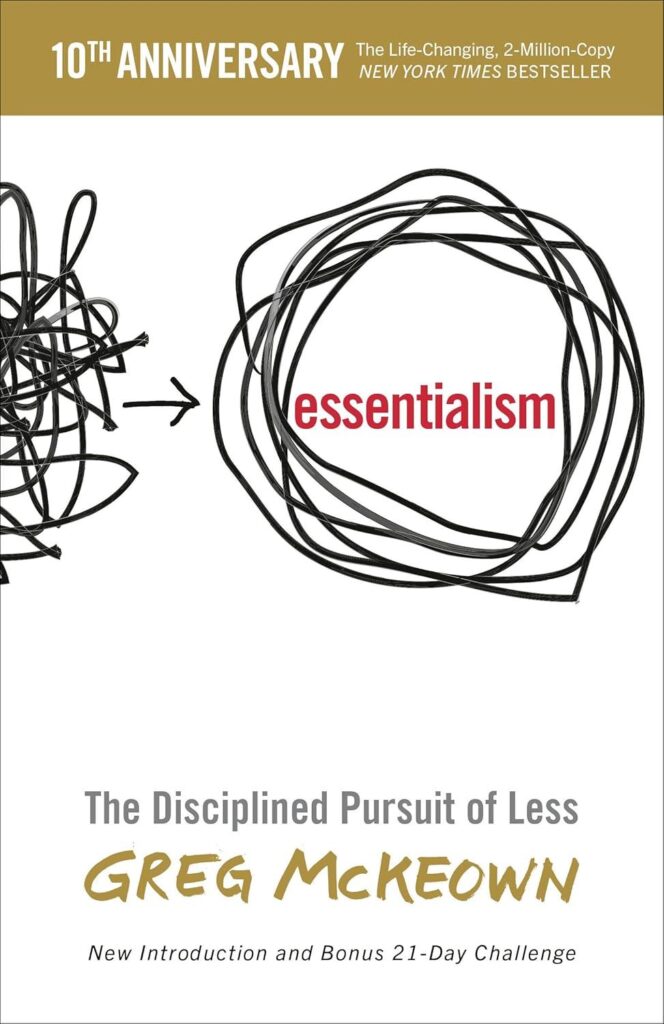
Greg McKeown’s Essentialism takes a different angle. Instead of focusing on how you work, it asks you to consider what you work on. Too often, we fill our schedules with tasks that keep us busy but not fulfilled. Essentialism cuts through this noise.
The Emotional Side of Essentialism
Essentialism is liberating. It gives you permission to say no. No to the club you don’t care about, no to the extra project that doesn’t align with your goals, no to the pressure of pleasing everyone. Instead, you learn to invest your energy in what truly matters to you.
For Students
Students especially benefit from Essentialism. School often feels like a race to do everything at once: study, sports, clubs, friendships, part-time jobs. But trying to do it all usually leads to exhaustion. Essentialism teaches students to step back, choose what really matters, and focus energy there.
Deep Work vs Essentialism: How They Differ
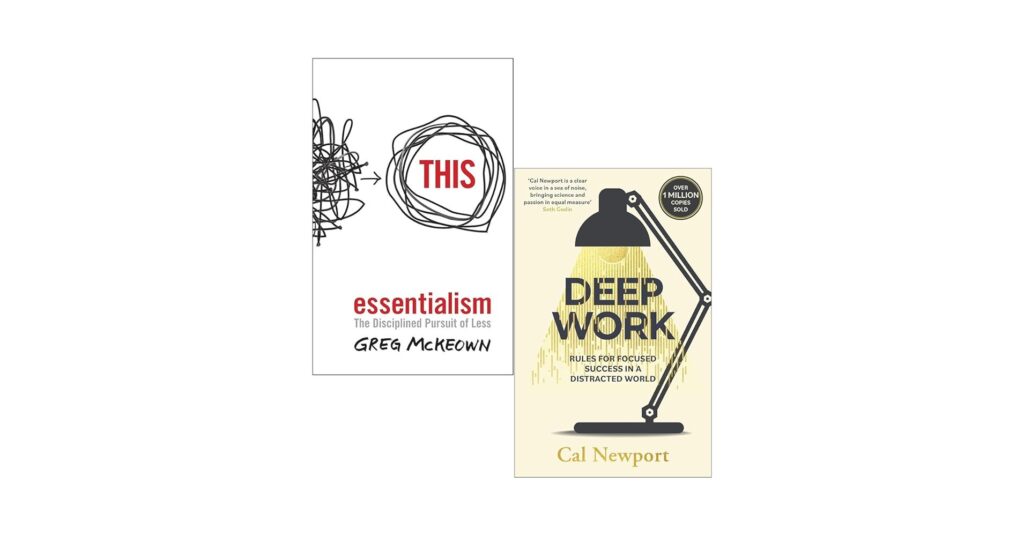
When comparing Deep Work vs Essentialism, the distinction becomes clearer:
Deep Work = method of focus.
Essentialism = method of prioritization.
Deep Work answers: How should I use my time once I’ve chosen my task?
Essentialism answers: Which tasks are even worth my time?
It’s like planning a journey: Essentialism helps you pick the right destination. Deep Work ensures you travel there with full energy and focus.
The Human Struggle with Balance
The real beauty of both philosophies is that they acknowledge something deeply human: we cannot do everything, and we cannot focus endlessly.
Essentialism respects your limits by teaching you to choose.
Deep Work respects your potential by showing you how to focus.
When blended together, they don’t push you to become a machine. Instead, they encourage a more balanced, humane approach to growth.
Combining Deep Work and Essentialism
Many people ask: Do I have to choose between Deep Work vs Essentialism? The truth is no. The most powerful approach is using both.
1. First, practice Essentialism. Decide what’s truly important this semester, this month, or even this week.
2. Then, apply Deep Work. Once you’ve chosen your essential tasks, give them your full attention in distraction-free blocks.
For example, a student might decide (via Essentialism) that preparing for finals is more important than joining another club. Then (via Deep Work), they create a schedule of focused, two-hour study sessions each evening.
Real-Life Examples
Student A tries to juggle everything clubs, assignments, side jobs. They burn out, and their grades drop.
Student B applies Essentialism, drops non-essential commitments, and then uses Deep Work to study with intensity. Their grades improve, and they still have free time to rest.
Which life feels better? That’s the human side of Deep Work vs Essentialism it’s not just about doing more, it’s about living better.
Practical Tips for Blending Both Philosophies
Bringing Deep Work vs Essentialism together in daily life doesn’t have to feel overwhelming. In fact, small and thoughtful steps can make the biggest difference. Here are some warm, practical ways to live out both philosophies side by side:
1. Start with clarity.
Each week, take a few quiet minutes to write down the 2–3 most essential goals for that period. Instead of scattering your energy across dozens of tasks, decide on what would truly move you forward whether it’s studying for a big exam, finishing a project, or investing time in personal growth. This step reflects the Essentialist mindset: less but better.
2. Protect your focus.
Once you know your priorities, carve out blocks of uninterrupted time to honor them. This is the spirit of Deep Work. Switch off notifications, set your phone aside, and allow yourself to dive fully into the task. Even 60 minutes of deep focus can feel more rewarding than hours of half-distracted work. Think of it as giving your best energy to what matters most.
3. Learn to decline.
Blending both philosophies means becoming intentional with your “yes” and “no.” Saying “no” politely but firmly to requests, projects, or distractions that don’t serve your essential goals is not selfish—it’s wise. Every time you decline a low-value task, you create more space for focused, meaningful work.
4. Reflect weekly.
Growth comes through awareness. At the end of each week, ask yourself: Did I protect my focus? Did I choose the right essentials? Reflection helps you notice where you succeeded and where you drifted. It keeps both Essentialism and Deep Work alive in your routine, not as abstract ideas, but as daily practices shaping your life.
Long-Term Benefits
Adopting both philosophies leads to more than academic or career success. It creates:
Peace of mind. No more spreading yourself too thin.
Confidence. Knowing you can choose what matters and actually get it done.
Balance. Time for growth, relationships, and rest.
Over time, the blend of Deep Work vs Essentialism becomes not just a productivity method but a way of living with intention.
Conclusion: Your Personal Path
So, when you think of Deep Work vs Essentialism, remember: it’s not a competition. You don’t have to pick one philosophy and reject the other. Instead, let them work together.
Use Essentialism to decide your path.
Use Deep Work to walk it with focus.
Life becomes lighter when you stop trying to do everything and start doing the right things deeply. Both philosophies invite you to slow down, reflect, and move forward with clarity. And that is the kind of wisdom that makes not just better students or professionals but happier, calmer, more fulfilled humans.
Frequently Asked Questions (FAQ)
1. Which is better for students: Deep Work or Essentialism?
Neither one is strictly “better.” The real value comes from combining both. Essentialism helps you decide what matters most, while Deep Work gives you the tools to focus on those priorities. Together, they create a balanced and effective approach to studying and personal growth.
2. Can I practice Deep Work without Essentialism?
Yes, but you may end up focusing deeply on the wrong tasks. Deep Work without Essentialism is like climbing the wrong mountain with great effort. Essentialism ensures you pick the right goals before committing your full attention.
3. Can busy students realistically apply both philosophies?
Absolutely. You don’t need to overhaul your entire life. Start small pick one essential task (like preparing for an exam) and dedicate an hour of deep, focused study time. Even tiny steps in the Deep Work vs Essentialism approach create meaningful change.
4. How does Deep Work vs Essentialism reduce stress?
Both philosophies reduce stress by cutting out distractions and unnecessary commitments. Instead of feeling pulled in every direction, you gain clarity and confidence about where your time and energy should go.
5. Do these approaches only apply to academics?
Not at all. While they’re perfect for school or university life, the lessons from Deep Work and Essentialism apply to careers, personal projects, relationships, and even daily routines. They are tools for life, not just for school.
Key Takeaways

Deep Work vs Essentialism is not a competition, but a partnership. One gives you the power to focus, the other guides you to focus on what matters most.
For students and busy learners, Essentialism helps you filter out noise, while Deep Work helps you dive into important tasks with full attention.
You don’t need a perfect system small, steady steps matter. Reading one chapter with full focus or saying “no” to one unnecessary commitment is a victory.
Both approaches reduce stress, improve productivity, and build confidence in your daily life.
The heart of both philosophies is simple: choose wisely, and then work deeply.
